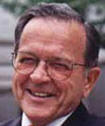Senate Appropriations Committee Marks Up CJS
Bill
September 4, 2003. The Senate Appropriations
Committee met to mark up several appropriations bills for fiscal year 2004,
including the Commerce, Justice, State, and the Judiciary (CJS) appropriations
bill. This bill includes appropriations for most of the technology related
agencies, including the Federal Communications
Commission (FCC), Federal Trade Commission
(FTC), U.S. Trade Representative (USTR),
Department of Justice (DOJ),
U.S. Patent and Trademark
Office (USPTO), National Telecommunications
and Information Administration (NTIA), National
Institute of Standards and Technology (NIST), and other Department of Commerce
entities.
The Committee released a short summary of the dollar amounts contained in the
bill. This release states that the bill provides $6.3 Billion for the DOC,
including $85.5 Million for the NTIA, $835.2 Million for the NIST, and $1.2
Billion for the USPTO. The bill includes $189 Million for the FTC, $277.8
Million for the FCC, $841.5 for the SEC, and $18.6 Billion for the DOJ and
related agencies.
However, most of the debate and discussion by the Committee at the meeting pertained to
several amendments to the bill that legislate substantive provisions with
appropriations clauses.
First, the Committee approved a manager's amendment that includes a provision
that prohibits the use of funds to grant licenses for a commercial TV broadcast
station if the granting of that license would result in such party having an
aggregate national audience reach exceeding 35%. This has the effect, during
fiscal year 2004, of reversing the FCC's recently announced change to the
national TV ownership cap. See, related story, below, titled "Senate
Appropriations Bill Prevents FCC From Implementing New National TV Ownwership
Rule".
Second, the Committee approved an amendment that, in effect, provides that Northpoint
will not have to obtain its spectrum at auction. See, related story, below,
titled "Senate Appropriations Bill Includes Northpoint Spectrum Amendment".
Third, the Committee approved an amendment that prohibits the USTR, during
fiscal year 2004, from negotiating immigration provisions in free trade
agreements. See, related story, titled "Senate Appropriations Bill Limits
Negotiating Authority of USTR" in TLJ Daily E-Mail Alert No. 733, September 5, 2003.
Senate Appropriations Bill Prevents FCC From
Implementing New National TV Ownership Rule
9/4. The Senate
Appropriation Committee approved the appropriations bill for fiscal year
2004 for the Departments of Commerce, Justice, and State, for the the federal
judiciary, and for related agencies, at a mark up meeting on September 4, by
unanimous roll call vote. The Committee approved a lengthy
manager's amendment offered by Sen. Judd
Gregg (R-NH), the Chairman of the CJS Subcommittee, and supported by
Sen. Ernest Hollings (D-SC), the
ranking Democrat on the Subcommittee, that includes language identical to the
House CJS appropriations bill regarding the national TV ownership cap.
That is, it prohibits the use of funds to grant licenses for a commercial TV
broadcast station if the granting of that license would result in such party
having an aggregate national audience reach exceeding 35%.
The House bill provides, at Section 624, that "None of the funds in this Act
may be used to grant, transfer or assign a license for a commercial TV broadcast
station to any party (including all parties under common control) if the grant,
transfer or assignment of such license would result in such party or any of its
stockholders, partners, members, officers or directors, directly or indirectly,
owning, operating or controlling, or having a cognizable interest in TV stations
which have an aggregate national audience reach, as defined in 47 C.F.R.
73.3555, exceeding thirty-five (35) percent." (Parentheses in original.)
This section has the effect of preventing the Federal
Communications Commission (FCC) from fully implementing, during FY 2004,
the national TV ownership provisions of its June 2, 2003
Report and Order and Notice of Proposed Rulemaking [257 pages in PDF]
amending its media ownership rules. See, story titled "FCC Announces Revisions
to Media Ownership Rules" in
TLJ Daily E-Mail
Alert No. 672, June 3, 2003.
On July 23, 2003, the House passed
HR 2799,
the "Departments of Commerce, Justice, and State, the Judiciary, and Related
Agencies Appropriations Act for Fiscal Year 2004", by a vote of 400-21. See,
Roll Call No. 422. See, story titled "House Passes CJS Bill With Media
Ownership Section"
TLJ Daily E-Mail Alert No. 705, July 28, 2003.
Sen. Byron Dorgan (D-ND) offered no
further amendments at this meeting. However, he announced that he intends to
offer an amendment regarding the newspaper broadcast cross ownership provisions
of the FCC's new media ownership
rules when the full Senate considers the CJS appropriations bill.
 Sen.
Dorgan (at left) stated that "I was intending to offer an amendment to that
that would repeal the provision that the FCC has developed allowing cross
ownership between newspapers and broadcast properties. I will not offer that amendment
to the provision that Mary has packaged now. I will rather do that on the floor
of the Senate."
Sen.
Dorgan (at left) stated that "I was intending to offer an amendment to that
that would repeal the provision that the FCC has developed allowing cross
ownership between newspapers and broadcast properties. I will not offer that amendment
to the provision that Mary has packaged now. I will rather do that on the floor
of the Senate."
He continued that "it is very likely that
before this bill gets to the floor of the Senate, before we deal with this on the
floor of the Senate, we will have under expedited procedures, the Congressional Review Act, and a
vote on a resolution of disapproval of the entire FCC rule. My expectation is
that that will happen very shortly. There are 35 signatures having been filed at
the desk, and the resolution of disapproval is now on the calendar. I have
been talking to Sen. Frist and Sen. Daschle about that. So, I will not offer the
amendment on cross-ownership today, but we will have that as an amendment on the
floor, as well, when this appropriations bill comes to the floor."
 Sen. Ted Stevens
(R-AK) (at right), the Chairman of the Committee, stated that "with the
Circuit Court decision, that decision has the effect of your amendment. I am
pleased that you will not offer it here. I want to tell you that I intend to
oppose that amendment on the floor, because I believe that the Circuit Court's opinion
sort of puts a whole new aspect to this."
Sen. Ted Stevens
(R-AK) (at right), the Chairman of the Committee, stated that "with the
Circuit Court decision, that decision has the effect of your amendment. I am
pleased that you will not offer it here. I want to tell you that I intend to
oppose that amendment on the floor, because I believe that the Circuit Court's opinion
sort of puts a whole new aspect to this."
On September 3, the U.S. Court of Appeals
(3rdCir) issued an
order [3
page PDF scan] in Prometheus Radio Project v. FCC,
staying the Federal Communications Commission's
(FCC) new media ownership rules, pending resolution of the proceeding. See,
story titled "3rd Circuit Stays FCC's Media Ownership Rule
Changes" in TLJ Daily E-Mail Alert No. 732, September 4, 2003.
Sen. Stevens added that "we are going forward on the cap provision,
and that is in the House bill,
that will take this FCC provision, really, out of conference, unless another
amendment is adopted."
"We don't need to be involved in a moratorium, or any decision concerning
cross-ownership", said Sen. Stevens.
Sen. Sam Brownback (R-KS)
announced his opposition to the section CJS appropriation bill regarding the
national TV ownership cap.
Sen. John McCain (R-AZ), the Chairman
of the Senate Commerce Committee,
which has jurisdiction over the FCC and
regulation of broadcast media, released a statement after the meeting. He said
that "I am greatly dismayed that the Senate Appropriations Committee has chosen
to usurp the jurisdiction of the Senate Commerce Committee today by including
authorizing language on its Commerce, Justice, State Appropriations bill. I have
never supported the use of the appropriations process to legislate policy, and
it is especially disappointing to see this misuse of the appropriations process
when the Commerce Committee has sent a bill to the floor that would address the
precise issue added to today's appropriations bill."
"With respect to the substance of today's action, I continue to be mystified
by the inconsistency of separating the national television broadcast ownership
cap from the local broadcast limits in legislation -- an action that seems only
to serve the members of the National Association of Broadcasters", said Sen.
McCain.
Sen. Dianne Feinstein (D-CA) spoke
with reporters after the meeting. She said that "Most of us just sort of
arrived at the fact that 35% is a fairer number. The cap issue was sort of an
easy issue. The other issue, on the cross ownership, is a much more difficult
issue. ... It depends on whether you have large media markets, or small media
markets."
She added, regarding cross ownership, "It is really not the
jurisdiction of this Committee".
Senate Appropriations Bill Includes Northpoint Spectrum
Amendment
9/4. The Senate
Appropriation Committee approved the appropriations bill for fiscal year
2004 for the Departments of Commerce, Justice, and State, for the the federal
judiciary, and for related agencies, at a mark up meeting on September 4, by
unanimous roll call vote. The Committee also approved by voice vote an amendment offered by
Sen. Mary Landrieu (D-LA) and
Sen. Kay Hutchison (R-TX) pertaining
to fixed terrestrial services in the 12.2-12.7 GHz band, that would enable
Northpoint to obtain spectrum without going to auction.
Previously, on June 26, 2003, the
Senate Commerce Committee amended and approved
HR 1320,
the Commercial Spectrum Enhancement Act, with an amendment pertaining to
Northpoint. See, story titled "Senate Commerce Committee Approves Commercial Spectrum
Enhancement Act" in
TLJ Daily E-Mail Alert No.
689, June 27, 2003.
Specifically, the June 26 amendment, which was offered by
Sen. John Sununu (R-NH) and
Sen. Maria Cantwell (D-WA), provides
that "Section 647 of the ORBIT Act (47 U.S.C. 765f) is amended (1) by striking
``global satellite communications services.´´ and inserting ``global satellite
communications services or for the provision of fixed terrestrial services in
the 12.2-12.7 GHz band.´´; and (2) by adding at the end the following: ``No
license for fixed terrestrial services in the 12.2-12.7 GHz band may be used for
the provision of mobile terrestrial telephony services.´´." That is, it amends
the ORBIT Act to exempt from auction spectrum fixed terrestrial services in
the 12.2-12.7 GHz band.
The House passed its version of the bill on June 11 by a vote of 408-10,
without the Northpoint language. See,
Roll Call No. 260.
NorthPoint describes its
technology as follows: "Northpoint is a patented, digital, wireless, cell based,
terrestrial transmission technology that reuses radio frequency spectrum
previously reserved for satellite systems. Northpoint can reuse this spectrum by
keeping the terrestrial signal below the level to cause interference to the
satellite signal, but above the level required to provide reliable terrestrial
service. This is accomplished through several means, one of which is directional
transmission. The Northpoint system consists of directional broadcast antennas
located on towers, poles, buildings or mountains. The transmissions are oriented
in a limited azimuth range, based upon the look angles to the satellite systems
with which the Northpoint system will share frequencies, allowing harmonious
simultaneous co-channel transmissions between satellite and terrestrial
services." See,
NorthPoint paper [9 pages in PDF]. See also, story titled "FCC Acts on
Northpoint Application" in
TLJ Daily E-Mail
Alert No. 417, April 24, 2003.

Sen. Landrieu (at right) stated that her amendment "has to do with with leveling the
playing field between the technologies that are in the video and broadband
service sector. Mr. Chairman, many of the members are familiar with this issue.
The Commerce Committee has considered it, held a hearing on it, considered it,
and approved what I am asking for our Committee to add to the underlying bill.
It is, in my opinion, a free enterprise
amendment. It is a pro-consumer amendment. It levels the playing field between the
between cable, satellite, and the MVDDS, which is the multi-channel video
distribution and data service new technology."
"It will do many things. Importantly, it will reach rural areas. Mr. Chairman, you have
been supportive of this because Alaska is one of those areas that is very
difficult to reach through the standard technologies. It will improve our emergency alert systems.
It will provide amber alerts", said Sen. Landrieu.
She concluded that "I generally support auctions, and would not normally support something
without an auction process. But, because we exempted satellite technology
from auctions three years ago, we should either require all applicants for a
particular spectrum band to go to auction, or none at all.
So, this amendment levels the playing field, clarifies it, is in line with what
the Commerce Committee did."
Sen. Conrad Burns (R-MT),
Sen. Ted Stevens (R-AK), and
Sen. Kay Hutchison (R-TX) also spoke
in favor of the amendment.
Sen. Hollings spoke in opposition to the amendment. He stated that it
replaces auctions with Congressional allocation of spectrum, and sets a
precedent for not holding spectrum auctions. Sen. Feinstein also opposed the
amendment.
Sen. Dianne Feinstein (D-CA) spoke
with reporters after the hearing. She said that "this is a public resource.
If people are going to
use it, they have got to pay something for it. And, you know, these companies
are not in there for non-profit. I mean, they make huge profits."
Northpoint issued a release after the meeting in which it stated that the
amendment "will pave the way
for rapid deployment of a new wireless communications service called MVDDS." It
added that the CJS language "is identical to the Sununu-Cantwell Amendment to H.R. 1320,
which the Senate Commerce Committee adopted on June 26."
 Sen.
Dorgan (at left) stated that "I was intending to offer an amendment to that
that would repeal the provision that the FCC has developed allowing cross
ownership between newspapers and broadcast properties. I will not offer that amendment
to the provision that Mary has packaged now. I will rather do that on the floor
of the Senate."
Sen.
Dorgan (at left) stated that "I was intending to offer an amendment to that
that would repeal the provision that the FCC has developed allowing cross
ownership between newspapers and broadcast properties. I will not offer that amendment
to the provision that Mary has packaged now. I will rather do that on the floor
of the Senate."
